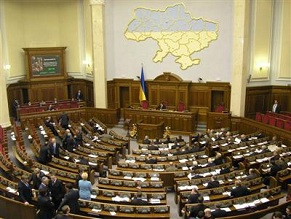|
World Jewish News

The Ukrainian parliament in Kiev.
|
EU leaders express ‘regret’ at controversial Ukraine vote, as they caution final result should ‘fully reflect the will of the Uk
02.11.2012, Jews and Society European Union leaders this week issued cautious condemnation of the recent elections in Ukraine, after the polls became mired in controversy with widespread reports of biased media reporting and “abuse of administrative resources”.
A joint statement by foreign policy chief Catherine Ashton and Enlargement Commissioner Stefan Fule merely conjured up “a mixed picture with several shortcomings”, as they reminded the incumbent government of its ongoing duty to “ensure proper conduct in the coming stages of the electoral process, notably as regards the remaining vote count, tabulation of results and following up on possible electoral complaints”.
The leaders went on to “regret that the consequences of trials that did not respect international standards have prevented opposition representatives from standing in the parliamentary elections”, adding that the final results not yet released should “fully reflect the will of the Ukrainian voters, as expressed during Sunday's elections”.
The European censure came as the Israeli Foreign Ministry released a statement Wednesday expressing “concern at the growing strength of extremist anti-Semitic elements in Ukraine and at the election to the Ukrainian parliament of the Svoboda (Freedom) party, whose members have often voiced racist and anti-Semitic positions”.
“Israel expects the Ukrainian government to take a strong stand against any manifestation of racism or anti-Semitism,” the official comment concluded.
European Parliament president Martin Schultz was more unequivocal in his condemnation of the political climate in which the polls were conducted, however, as he expressed his concern at “the lack of a level playing field among political forces”. Whilst paying tribute to the peaceful balloting process and the high electoral turnout amongst eligible Ukrainian voters, he insisted that “Campaign and party financing lacked transparency and media coverage was tilted in favour of the ruling party. Continued imprisonment of prominent opposition activists cast a shadow over the election process.”
Last month, Pawel Kowal, Chairman of the European Parliament’s Delegation to the EU-Ukraine Parliamentary Cooperation Committee, issued a statement criticising a Ukrainian court ruling to impose a fine on independent television station TVi. The enforcement of such a decision in the midst of a parliamentary election campaign, he insisted, constituted “a serious weakening of media pluralism in Ukraine”.
“The possibility of broadcasting by different media channels is one of the basic judgement criteria as to whether the elections are free and fair,” he added. The September 12 ruling by the Ukrainian Court of Appeal found that the channel owed authorities the equivalent of €300,000 in unpaid taxes, thereby restricting the station’s transactions with foreign media partners and removing from a list of 80 operating cable tv networks in Ukraine.
The parliamentary delegation’s criticisms of media bias followed similar objections in July to reports of inspections by government and tax agencies of media outlets, which it claimed ran contrary to the parliament’s February resolution to ensure “the unimpeded activity of the media during election period in 2012”.
Former Polish President Aleksander Kwasniewski, who was charged with heading the EU’s electoral monitoring mission to Ukraine” said that the “test t have free and fair elections is decisive for the future of Ukraine”. Contending that it was the only way of pursuing open dialogue between the EU and the former Soviet state, who have negotiated an as-yet unsigned association agreement, he added that despite the challenging political climate in the country following 70 years of Soviet rule, “I'm much more optimistic about Ukraine than many other post Soviet countries”
“Ukrainian people deserve to live in a well-functioning democratic state,” Schultz concluded, in his post-election statement, echoing Ashton and Fule’s calls for the administration to respect its nation’s apparent calls for the fulfilment of a “democratic and pluralistic society”.
MEPs have previously expressed concerns about the jailing of Prime Minister Yulia Tymoshenko and other key opposition politicians and how the administration treats political rivals. The European Parliament has also called on Ukraine “to respect the principles of the rule of law and democracy if it wants closer relations with the EU”.
The vote produced further shockwaves with the apparent rise to dominance of staunch nationalist party Svoboda, whose estimated 12% return at the polls represents its best ever result and established it as the third largest political party in the country.
Party leader Oleg Tyagnybok capitalised on opposition to ruling President Viktor Yanukovych’s perceived courting of Russia, by emphasising Ukraine’s distinct cultural identity and sovereignty over its former Soviet rulers. Despite other less palatable xenophobic, homophobic and anti-Semitic ideology, such policies struck a chord with the primarily Ukrainian speaking west of the country.
Ukrainian Jewry represents the third largest Jewish community in Europea and fifth largest in the world. The Jewish community is mainly concentrated in Kiev, with a population of 110,000, with 60,000 in Dnepropetrovsk, and 45,000 each in Odessa and Kharkov.
The Ukrainian-speaking west of the country is home to only a small proportion of today’s Jewish demographic, with the majority of the community comprising native Russian/Ukrainian speakers.
The Jewish population is in decline, largely due to emigration and to the aging process, with an average age of 45.
EJP
|
|
